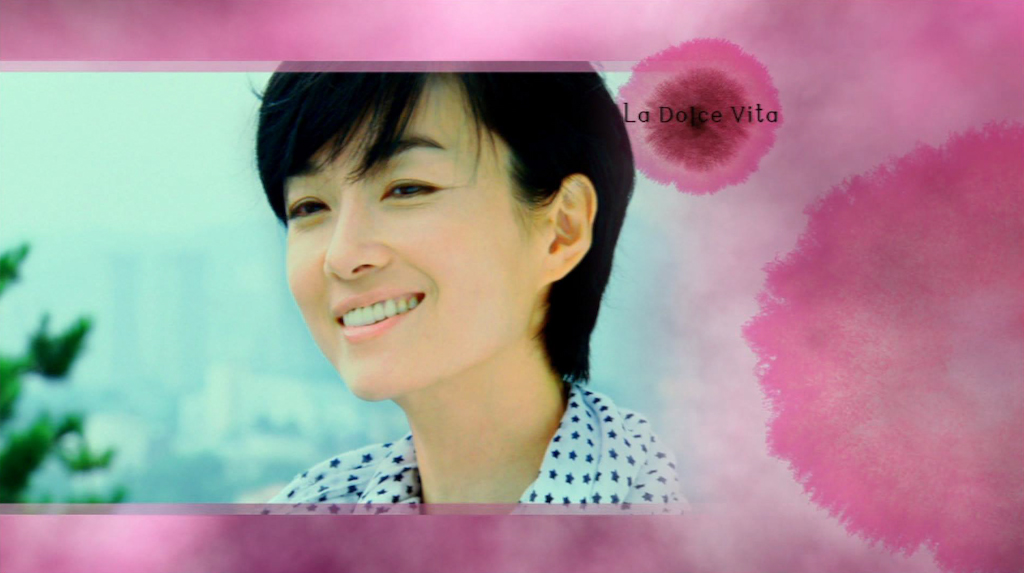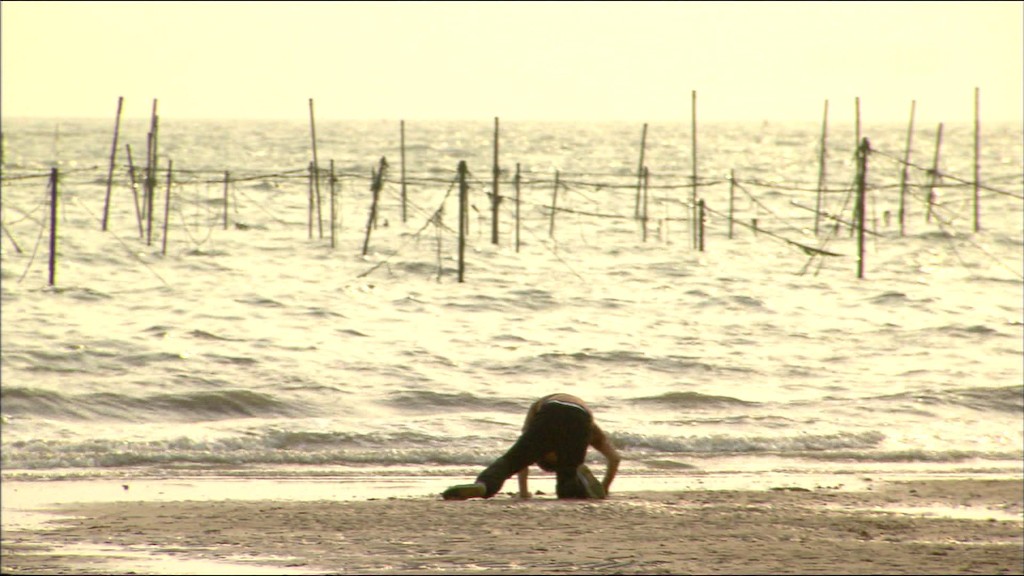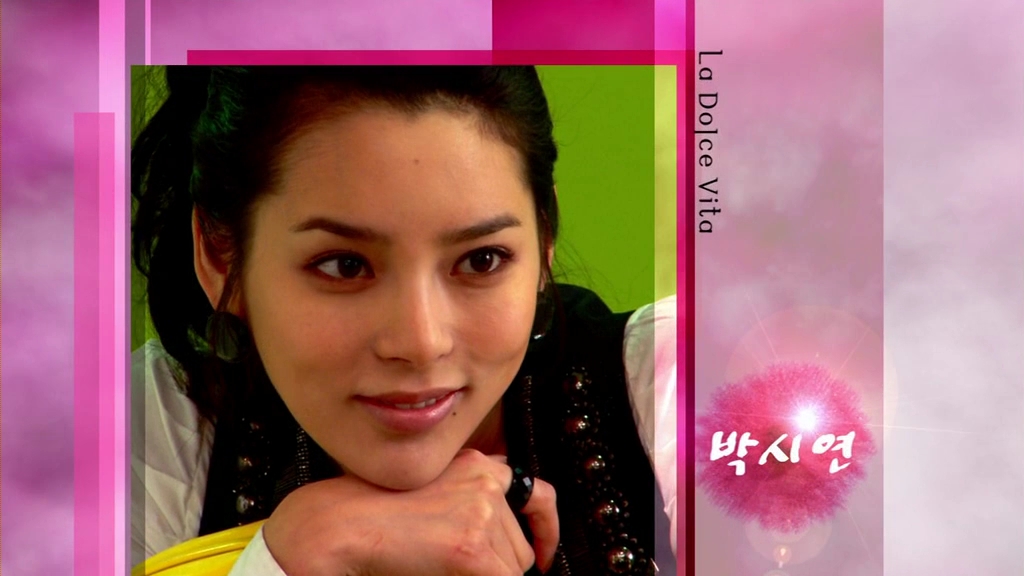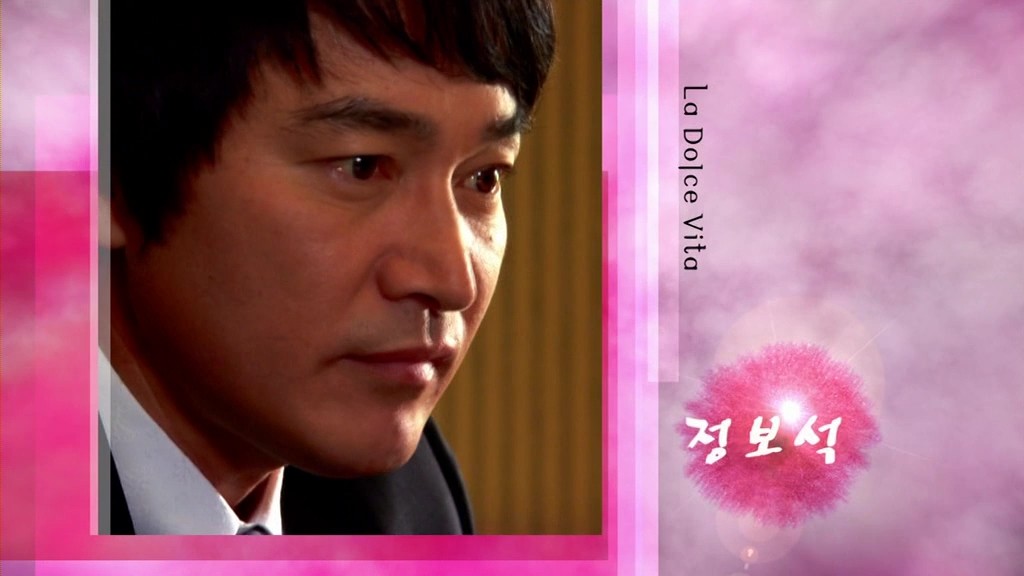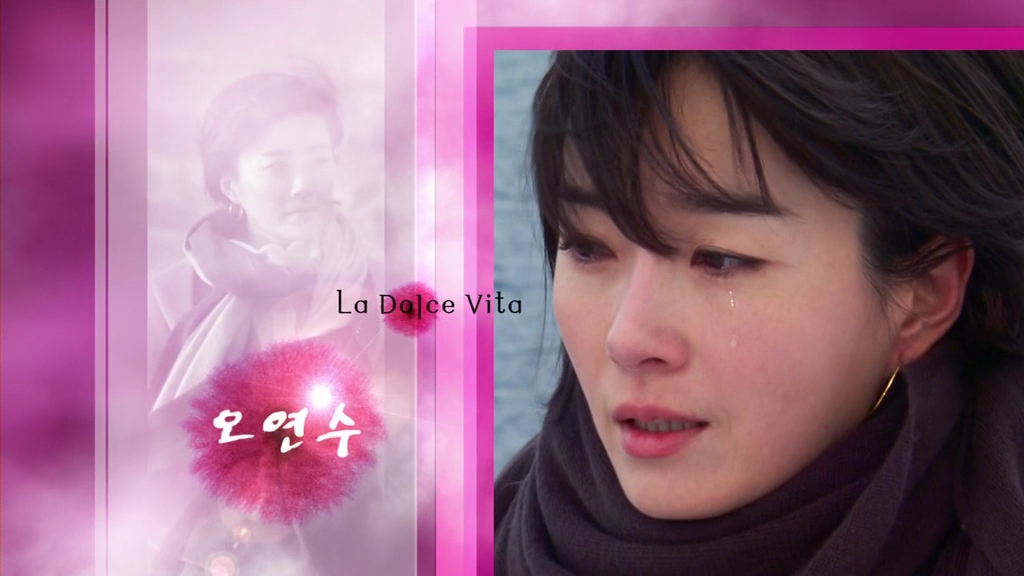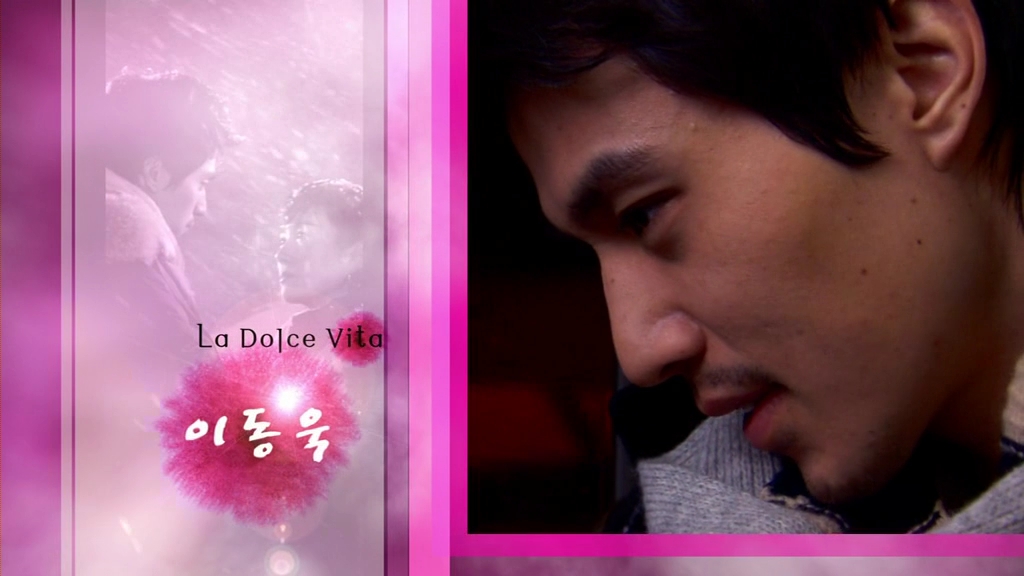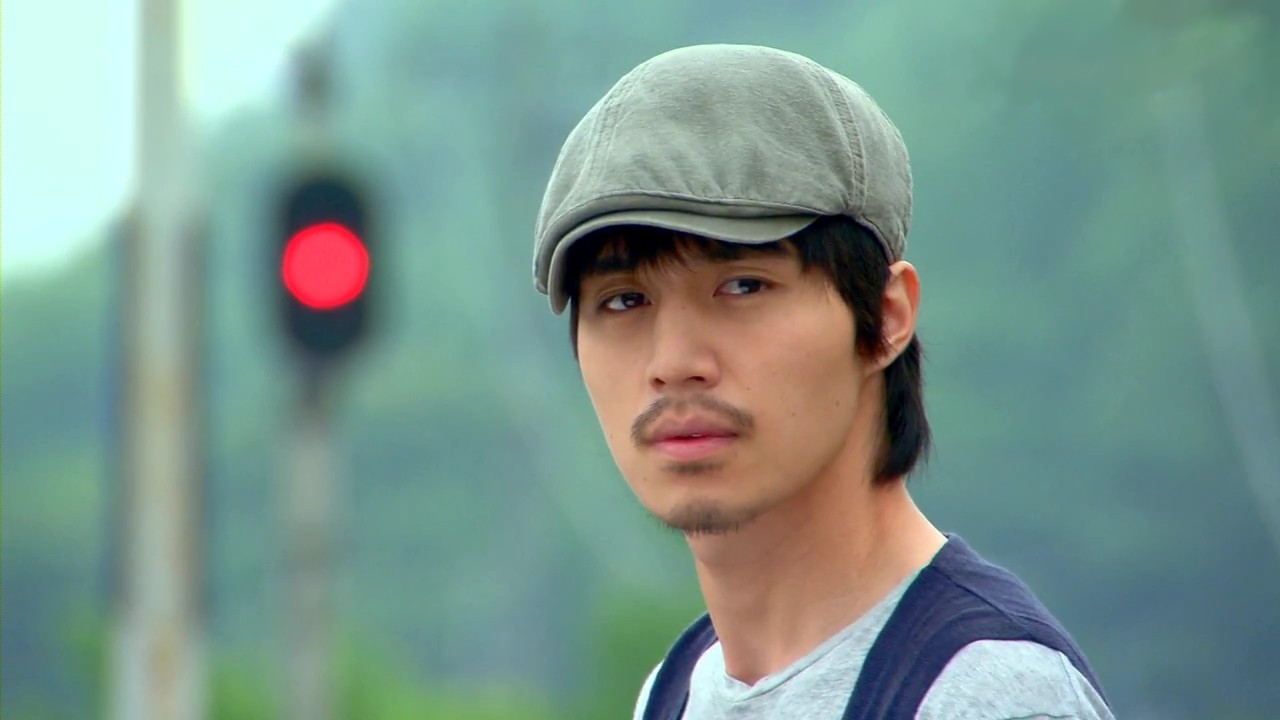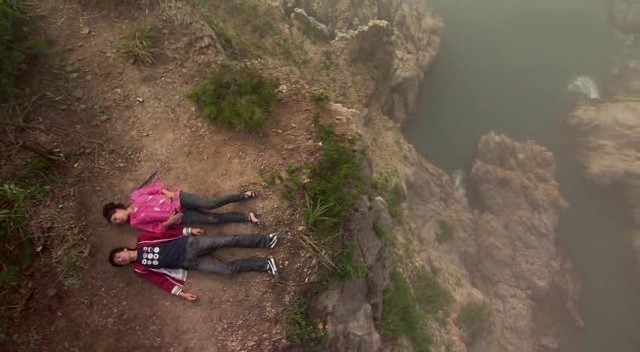[K-DRAMA REVIEWS] 달콤한 인생 (La Dolce Vita)
![[K-DRAMA REVIEWS] 달콤한 인생 (La Dolce Vita)](https://screenanarchy.com/assets_c/2012/09/dolcevita-thumb-430xauto-8785.jpg)
The inseparable pack of cigarettes on one side, the burdensome emptiness of a blank page on the other, all the menacing sound of silence enveloping it; the pen next to it, bearing the pomp and circumstance, the weight of a sword ready to penetrate into that endless white. Like a war fought with one's imagination, choosing where and how it will start, what will signal that long awaited, mentally draining end. The bittersweet aftertaste full of lights and shadows; a moment of relax, and the urge to start again, because as much as it pains you to go on, that thirst is what keeps you alive. Jung Ha-Yeon still writes dramas in that old "analogue" way, just like when he started writing plays in the 1960s. A thousand handwritten characters per page; twenty five, thirty pages per episode at most. Words catching fire, as if pens were an idrant pouring creative fuel on an inflammable surface. Forty long years, spent running after that elusive, mysterious fire fate only bestows upon the best.
Korean TV dramas have always been accompanied by that exacting moniker: 대중문화, culture for the masses. Although we're dealing with the most drama-crazy nation on Earth, there's nearly no critical discourse about this medium online or in print, unlike the rivers of ink spent over Chungmuro's karmic trips. It's in that sense that the work of Jung Ha-Yeon, particularly in the last decade, feels like a scimitar wading through an ocean of condescending mediocrity, showing what dramas can really achieve. But, on the other hand, only a tiny portion of Korean drama fans are willing to make that emotional and intellectual investment into something that shouldn't always be a mere divertissement, sandwiched in between dinner and sleep. It all makes things like 달콤한 인생 (La Dolce Vita) feel like broken glasses of the most savory of wines, half of their flavor wasted on all the cracks of the system, slowly dripping away.
Born in Hwanghae Province (current North Korea) in 1944, Jung's first taste of what would become his lifelong obsession came when, back in college, he entered a theater group. You'd think his reason for participating might evoke memories of The Bard, or the great thespians of the past. But, nah. He just wanted to keep his hair long, and in the Korea of the 1960s becoming an actor was the only way a student could grow them locks and not taste the sweet baton. Then again, things wouldn't be so easy. If you get on the stage and everything you can think of is "why is that guy in front of me reacting like that?" a change of career is recommended. Thankfully for us, Jung changed his mind, and after abandoning his acting career started writing plays. Mighty successful ones at that.
The raging export-oriented industrialization of the 60s and 70s saw a sort of cultural renaissance develop, especially in the capital Seoul, thanks to all the input for great stories Park Jung-Hee's ruthless regime created. Poets, musicians, novelists, journalists, screenwriters from all walks of life flourished. It was a golden age for Korean culture, prosperity which also influenced Jung in his growth as an author; his view of the world and philosophy displayed in all his dramas was oozing with the smell of that cultural revolution. 산울림 (Echoes) won him the Seoul Shinmun Spring Short Play Award in 1968, followed by Best New Author at the Sejong University Literary Awards for 무지개 쓰러지다 (Falling Rainbow) and several other awards in the late 60s. He went as far as winning the Best Stage Play award at the prestigious Baeksang Art Awards in 1973, right as he was starting to make a name for himself in Chungmuro.
In many ways, the 70s was the darkest decade in Chungmuro history. The talented (Kim Ki-Young, Yoo Hyun-Mok, Jung Jin-Woo, Ha Gil-Jong etc.) continued to excel, albeit it couldn't be as prolific an output as in the 200-plus film per year rush of the 60s. Problem, of course, was everything else: artless commercial flicks devoid of any flair or passion, keeping the masses entertained while the bulldozer policies were doing their job; sordid propaganda garbage, pornography of the mind used by people who knew all too well the allure of mass media. In such an atmosphere, Jung's first few film scripts weren't exactly the epitome of innovation. It was in many ways what Im Kwon-Taek experienced behind the camera in his formative years: a little bit of everything, to form a backbone. Some of it worked, the majority was just there.

More than having any particular artistic value making them stand on their own, the languid melodramas and high teen romances Jung was involved with in the early 70s were just a small fraction of the versatility he'd show in his forty year career. Jung is in fact one of the few, if not the only man to ever write scripts for theater, movies, the radio dramas so popular up to the advent of television; and of course TV dramas, covering the entire scope from the defunct TBC to KBS, MBC, SBS, even EBS and possibly cable (if Dramax ever decides to broadcast that China-Korea coproduction Jung recently wrote). He's done everything from adultery melodramas to traditional home dramas, from stoic political sageuk to nostalgic, glorious period dramas like 명동백작 (The Count of Myeongdong). But there's always a consistent, recurring theme in most of his best work. His love for literature.
Whereas the 70s were the worst of times for Chungmuro, it was the opposite for TV: two dueling daily dramas, KBS' 여로 (Journey) and TBC's 아씨 (Lady) set Korean airwaves on fire during the spring and summer of 1972. The shows were so popular they actually moved people to buy television sets, and arguably represent the first ever "ratings war" in Korean TV history. Jung started writing for TV in the second half of the 70s, mostly working for TBC, with a few political dramas and his first ever sageuk, 연개소문 (Yeon Gaesomun), particularly standing out. After taking part in the omnibus sageuk horror series 전설의 고향 (Hometown of Legends) for KBS, he started embarking into a period which would define his style for decades to come.
Although most people are surprised Korean dramas have no seasons, and self-contained stories are usually left to short dramas, things weren't always this way. For the better part of the 1980s, the most popular dramas were situation series like 수사반장 (Chief Inspector) or 암행어사 (Royal Secret Agent), running for several years, with a different story for each episode. The format would slowly vanish in the late 80s due to the growing competition between stations and the advent of miniseries, but there was an alternative. Short dramas in the last five years have more or less represented a sort of training farm for young writers, producers and actors. But when they started en masse in the 80s, it was another story. The idea was to steal the last remaining film aficionados from the big screen, offering a similar experience in the comfort of their homes.
Short dramas in the 1980s, especially MBC's 베스트셀러극장 (Bestseller Theater), had a higher budget, film-like running times, outdoor location shoots and ENG cameras, top stars and the most respected writers and directors. The peculiarity, hence the "bestseller" label, was that they were usually adaptations of popular Korean or foreign novels. This is how Jung started making a name for himself in the TV world. Be it MBC's version, or KBS' TV 문학관 (Literature Series), the story was the same: Jung's theater roots, his growing during the cultural renaissance of the 60s built his love for literature, allowing him to slowly establish his own style, with a very strong novel-like flow to his work you can still feel as of today.
For the better part of the 80s, Jung would continue alternating between short dramas adapted from domestic or foreign novels, and more mainstream fare, like the first, extremely successful 아내 (Wife) in 1983. With no Internet, radio's influence slowly waning and Chungmuro still dealing with repercussions from the 70s (despite Bae Chang-Ho's successes), TV became the average Korean family's entertainment venue of choice. Some of the most popular MBC shows, particularly the Weekend Dramas written by Kim Su-Hyeon, would record insane ratings of 70% and over, while Lee Byung-Hoon and Shin Bong-Seung's 조선왕조500년 (500 Years of Joseon Dynasty) drew an entirely new map for what concerned sageuk on TV. Despite this second Golden Age of Korean TV, Jung Ha-Yeon made an important decision in the late 80s. It was time for a change, decision which brought him to New York City.

Imagine this forty something Korean screenwriter, with a good twenty years of career back in his homeland. The praise of his peers, several prestigious awards, some really popular series in the tank and the prospect of a comfortable late career if he only wanted. But Jung's decision was called LaMaMa Theater, a small venue in lower Manhattan, one of the leading lights of the off-off-Broadway movement. Jung produced about a dozen plays there between 1988 and 1989, away from the tumultuous changes Korean Tv and Chungmuro were going through. Korea was on its way to democratization, SBS joined the ratings war, and a little drama called 여명의 눈동자 (Eyes of Dawn) was ready to change all the cards on the table.
Although it would take until 1995 to see such change, Jung started building his current reputation thanks to something he mostly had been avoiding his entire career: sageuk. Why would a veteran writer like him possibly avoid something as interesting as historical dramas? Athough in the 70s there were sageuk targeted at female viewers, for the better part of the 80s and early 90s sageuk were all about old men with fake mustaches sitting at a roundtable, spending two months' worth of episodes arguing about the funeral rites of some king's dead mother, or busy getting lung-related problems for screaming "Jeonha (Your Majesty)" with too much fervor. Why Jung Ha-Yeon wouldn't fit with this setup is simple: he's always shown a rather feminine sensibility in his works, which wouldn't have gone too well with the machismo and bravado of the genre. For a good thirty years, he only wrote a handful of sageuk, until 장녹수 (Jang Nok-Su) changed it all.
Before 1995, the portrait Prince Yeonsan had been receiving on TV and the big screen was almost always taken from Park Jong-Hwa's novel 금삼의 피 (Blood on the Silk Robe), a 1930s masterpiece of Korean literature, but in many ways stained by the traditions of historical discourse from that time. That is, Yeonsan as the young and promising king who suddenly finds out the truth about his mother's poisoning (hence the bloody silk robe), and then turns into a mad despot, sending the whole country into the pits of hell for decades. Although a group of historians had been offering a different perspective on the matter for years, nobody really had the guts to change narrative traditions which had lasted for decades. Instead, Jung Ha-Yeon's Yeonsan (played with immense charisma by Yoo Dong-Geun) was a political animal, feigning madness to strengthen that authority of the throne which had been sorely lacking since King Sejo's death. He painted him as a person first, full of flaws but also not without his charms, and made his relationship with favorite concubine Jang Nok-Su a little more than just meets the eye.
It would just be the first of many controversies. Although 조광조 (Jo Gwang-Jo), about the failed reformist in the Joseon of the 15 Century, didn't go as well as planned, it was with 왕과 비 (The King & The Queen) that Jung opened a new chapter in the history of political sageuk. Infamously fighting a war of words with historian Lee Deok-Il over the portrayal of King Sejo and the Six Martyrs, the show spanned everything from the reign of King Munjong to Prince Yeonsan, one of the most tumultuous periods in Korean history, throughout its 186 episodes. Still, Jung's most controversial work to date remains 2001's 명성황후 (The Last Empress).
Empress Myeongseong (a.k.a. Queen Min) was the consort of Gojong, (the last king of the Joseon Dynasty), assassinated by killers sent by Japanese foreign minister Miura Goro, in the escalation which led to the Japanese colonization of Korea. The real fight was always between historians influenced by a rather "colonial" historical legacy and those with a nationalist slant, but Jung, as he always does, focused more on people than finger pointing. Although his shows do have so called villains, you're always given their side of the story, and the protagonist's actions wouldn't always be righteous and just, as his real masterpiece 신돈 (Shin Don) would show a few years later.

If you believe the Annals of the Goryeo Dynasty written by the winners (those who founded Joseon), Shin Don was a sort of Korean Rasputin, a mad monk who negatively influenced King Gongmin and sent Goryeo on the way to its demise. But what Jung did was turning the cards, not simply looking at historical texts, but who wrote them, and why they were written that way. The portrayal of Shin Don, King Gongmin, Mongol Princess Noguk and all the decadence leading to the fall of Goryeo which emerged created one of the deepest, most meaningful works of art Korea has ever produced, with monster acting from all involved. It had an irresistible atmosphere, as if you were experiencing a Buddhist sutra narrated by Shakespeare; dark, gloomy and poignant, but with the wit of an old sage who knows all too well what life is really about.
Shin Don was only marginally successful online, particularly thanks to the DC Inside community and the sorely missed work of the Dramamob crew. Its ratings were in the lower 10%s for most of its run, and as far as MBC goes it might just be remembered as 17 Billion Won wasted down the drainer, on that insanely beautiful Yongin set, the lavish costumes and the realistic and (relatively) accurate props. Yet, this and last year's 한성별곡 正 (Conspiracy in the Court) represent some of the best work the industry had to offer in the last decade or so. They weren't shows merely concerned with entertainment and scoring ratings. They left a mark, philosophically and in terms of storytelling, historically and even emotionally, which is what the best sageuk should do.
One hopes the next project Jung Ha-Yeon has "been preparing for ten years" turns out to be 이방자 여사 (Madame Lee Bang-Ja), a very unlucky drama from the get-go. The show was announced in 2006, with Kim Hee-Ae being cast as Lee Bang-Ja, better known as Princess Uimin, the consort of Crown Prince Eun. This would be the first important sageuk of the "modern TV era" taking place in the 20th Century, if you consider things like 제5공화국 (The Fifth Republic) too close to home to be considered past. She had a very dramatic life, one that Jung Ha-Yeon could turn into pure gold, and would become a sort of follow up to his The Last Empress. But in the money-crazy and increasingly superficial world of Korean TV, such a serious, complex project will find it hard to get the green light. After changing hands for months and finally showing up on SBS lineups up to late last year, there's no word of the show whatsoever these days. Yet, those hungry for more Jung Ha-Yeon could rejoice this summer: La Dolce Vita came to the resque.
It was in many ways a family reunion: with Jung writing the script, Kim Jin-Min of Shin Don was directing, the Samhwa Networks that has always worked with Jung producing, Jung Ha-Yeon regular Jung Bo-Seok was starring, and most of the staff were familiar faces, including music director Hwang Sang-Joon. One of the reasons the lack of critical discourse about TV dramas is lamentable lies exactly with the work of Kim Jin-Min. If he were a film director, he'd be paired alongside people like Park Chan-Wook, Bong Joon-Ho or Kim Jee-woon, but since those "soap operas" are the bastard sister of film, few people outside Korea know how maniacally talented this man is. If Shin Don wasn't enough, last year's 개와 늑대의 시간 (Time Between Dog & Wolf) showed there can be life without HK Noirs in Asia. Too bad about that finale, but that wasn't his fault. And fans of John Woo's heroic bloodshed might even love it.

The magic couple of Shin Don was reunited, for what at first was to be a noir thriller entitled 내 몸에 악마가 산다 (The Demons Inside Me). This would have starred Oh Yeon-Su as a woman with a dark past, marrying into a rich family while hiding her identity. The catch? She'd kill anyone who tried to find out who she really was. Does sound interesting, but in many ways Oh Yeon-Su would have had to go through too drastic an image change to look believable. After discussing with director Kim, the two decided to go for something else, and the title eventually changed to the current La Dolce Vita. It sure makes you think of Marcello Mastroianni and the Fontana di Trevi (or, well, a wet Anita Ekberg in it. That is), or maybe even Kim Jee-woon's delicious half-tribute 달콤한 인생 (A Bittersweet Life). But the similarities are mostly in terms of storytelling: La Dolce Vita uses flashbacks and continuity in peculiar, at times disconcerting ways.
After all, Shin Don was famous for spending 20 minutes of its first episode showing flashbacks, unlike the "throw any historical figures' youth at the wall hoping it will stick" shenanigans of most fusion sageuk. It is definitely a fragmented narrative, filled to the brim with voiceovers highlighting the characters' state of mind. But it's not the good old excuse to solve exposition with a few cheap words, there is a logic behind such - at times - excessive use of voiceovers. What we're seeing on the screen are living, breathing masks worn by these four people. Those are masks they can't strip, even in front of people who are supposed to be their closest confidants, hence the voiceover denuement. And it works. Oh mama, sure it does.
Ha Dong-Won (Jung Bo-Seok), for instance, is like a walking thesis on alpha males' own sense of insecurity. He sacrificed his own youth to become the best, and even turned an accident (getting his current wife pregnant) into an opportunity, making a nice family out of it. He stabbed people in the back when needed, and organized his life in ways that even predicted the downtrends that affected the dollar, the size of his villa, and even which way the zipper in his pants had to move. He climbed this glass tower of power for twenty years, and finally found himself trapped by thirst. The word fun has abandoned the building a long time ago, but take off the thirst and there is no will to continue. Take off that, and you start realizing you had no youth, your friends hang around you because of your money, and even your wife has just become a stranger. So he finds Da-Ae (Park Si-Yeon). She's young, cheerful, and "cool." She knows what this is all about, and doesn't cross the line, that is. Sounds like a good excuse to postpone all the existentialism.
Then again, that's just a mask Da-Ae is wearing in front of Dong-Won. Thanks to his copious sentimentality, proven with a slight purge of the wallet and assorted designer bags, she's been living like a princess for three years. She can wake up in the morning without worrying about her future, she can have anything she wants, and doesn't have to go through all the responsibilities and the headaches that come with married life. But then she gradually realizes all that is an empty bubble, that the morning "jogging" session with Mr. Ha which turns into sex, shower and coffee won't go on forever. And then? You wake up at thirty with some leftovers of that past relationship, a Mini Cooper S that was great when you were twenty and cared about getting mosquitoes in your hair while driving, and that scary, empty baggage called "my past life."

Da-Ae understands she needs to stop all this, that it is nothing but empty addiction to a life she doesn't even enjoy anymore. But it's not so easy when Mr. Platonic Sex pops bottles of Château Margaux as if they were soda, throws expensive jewels at her like confetti, and brings out the charm right at that moment, when she has the guts to wake up and say "enough." You can admit to yourself living like a gold digger is wrong all you want, but when that routine becomes your 24/7 for a couple of years, then thirst is all that matters. Breaking that circle would be like stealing the oxygen tank from a diver, the needle from a junkie, or killer veggie trucks from Yoon Seok-Ho dramas. Even if you hate it, you need that to survive. That bittersweet life the characters are looking for is something, anything that will resemble happiness, whatever sweet life lies ahead after stripping themselves off that damn thirst.
Hye-Jin (Oh Yeon-Su) would be the perfect example. She's lived as the model wife for ten years; she had her daily routine most married upper-class ajumma with two kids and assorted histeric housemaids go through; a distinct lack of love and communication but... seriously. Who needed that? The illusion of a great marriage, the collection of "Have a nice day, Honey" thrown at the wall like a script for a cheap daily drama; going out, assimilating culture you never cared about to maintain that aura of status symbol, parasiting in the "bling" that your life had become. Nothing more than a routine, but it didn't sound too bad. Until she found out why the hubby was always so sleepy at night. Ahh... it's an adultery drama all right.
Then again, not really. When you think of adultery dramas, Kim Su-Hyeon and last years' 내 남자의 여자 (My Man's Woman) instantly come to mind. Even a single hour of the first episode hadn't passed, and Kim Hee-Ae and Ha Yoo-Mi were already on the floor, swearing like beer guzzlers and thinking the Greco-Roman finals had come a year earlier, a little east of Beijing 2008. Hye-Jin's discovering her life wasn't what it first appeared doesn't set in motion a typhoon of screaming contests and hair pulling concertos, it makes her realize a shocking truth: that it was all a lie. The perfect family, that 24 carat life, the smiling little daughters and the A to Z that her day had become. All of it. This is where the real force of Jung Ha-Yeon can be truly felt.
If this were any other drama, you'd see the wife react in either a very patriarchal ("I have two kids and a dog! Need to go back home and play traditional wife, pronto"), or a forcefully progressive way ("I. Like. Young. Butts and I cannot lie"). This is not any indication of a human being making a decision that will affect her life, but more a social statement, in the latter case a sign that things have changed - and in some ways things like 앞집여자 (The Woman Next Door) are guilty of that. But no, Jung goes back to his roots, that focus on legitimizing a human being's state of mind, whatever he or she is thinking. If you suddenly realize your last ten years have been a castle of lies made of invisible cards, then the castle will fall, no matter if kids are standing on those frail cards or not. Her decision to go to Otaru in beautiful Hokkaido and, well, die, shows that better than any screaming concerto would.
Otaru represented her youth before this game of lies started, back when the "ogenki desu ka" of Iwai Shunji's ラヴレター (Love Letter) colored her days as a twenty something exchange student in Japan; it was before the world she was living in was clouded by things she couldn't predict, when she could express herself without causing butterfly effects that would hurt worldwide economy. When, in short, she didn't need any mask. So she goes back, she forgets about the husband, the kids, the house, the life she had. To hell with that. And she stares at the ocean, from that mountain buried in snow. She stares down, and thinks. How long would it take to get there. 1 minute? 30 seconds? No, maybe even less. But then one hand catches her, it breaks the ice that had frozen her life the last ten years. And we're back to day one. To him, it's not the wife of Ha Dong-Won, broker tycoon and whatever other title you want to stick on him. It's not someone's mother, or daughter-in-law. It's just Yoon Hye-Jin, without masks.

That this man happened to be Lee Jun-Soo, played by Lee Dong-Wook, was a source of worries right from the beginning, just like Park Si-Yeon was. Although 아랑 (Arang) was a step in the right direction, it was hard to expect anything from the young actor, not necessarily because he didn't have acting chops. It's just that, for someone who debuted in 1999, he rarely starred in anything that could possibly test one's potential (or lack thereof), and was mostly content with pedestrian fare such as 마이걸 (My Girl). Jun-Soo was an extremely dark and conflicted character, with a gloomy past and trapped by a mask which prohibited him from finding solace. You'd think it was a job for people like Lee Cheon-Hee or Yang Dong-Geun, Jo Seung-Woo or Oh Man-Seok. But... Lee Dong-Wook?
Park Si-Yeon was in an even worse position. She'd probably be the first to admit her rise to stardom was mostly thanks to her being Eric Moon's - currently riding fake horses in 최강칠우 (Strongest Chil Woo) -- girlfriend, and her acting in My Girl and 연개소문 (Yeon Gaesomun) was so atrocious she was able to turn serious scenes into unintentional slapstick comedy. But then something started happening, albeit very slowly. Be it because she realized life after breaking up with Eric could have given her a one-way ticket to public indifference in a few years, or just because she fell in love with acting. But not only her performances, her choice of projects improved as well. She was OK-ish in Kwak Kyung-Taek's 사랑 (A Love) and the drama 꽃 피는 봄이 오면 (When Spring Comes), yet it certainly didn't prepare for her shocking improvement shown in La Dolce Vita.
Da-Ae would fit perfectly with the versatility of Lee Da-Hae (she's the opposite case: truckloads of talent but no interest in decent dramas), but in some ways it feels like a character written with Park Si-Yeon in mind. Superficial gold digger one moment, pitiful and lonely soul the other, she showed such transitions (sometimes happening in a few seconds) with admirable panache, highlighting the darker moments with the kind of maturity she had never shown before. It certainly could be a case of a great behind the scenes crew elevating one's performance, such as the impressive turnaround Kim Min-Hee showed in 굿바이 솔로 (Goodbye Solo). Yet, you clearly can see Park Si-Yeon gave her own color to this character, the kind of personality that not only synthesizes what's on the script, it also gives it a personal spin. Not to repeat what was said for Kim Min-Hee in the past, but this is the start. From now on, Park Si-Yeon is not just a pretty face who got lucky and started acting. Enter Park Si-Yeon, the actress.
Lee Dong-Wook is another story. He certainly had a little more talent getting in, but this is a very, very demanding character. Jun-Soo called himself a "crocodile bird," eating off of whatever rotten drecks were waiting in the crocodile's mouth. This points to the parasite relationship Jun-Soo was experiencing with his friend Seong-Gu (suitably sleazy and stuck-up Jung Gyeo-Woon, another strong improvement). It was like a man trying to free himself from quicksand, with the extreme desire of getting out but everything else pulling him down the abyss.
The result? A very strong performance, in many ways showing how much Lee has improved since then. Yet, he's the only one of the four leads who, from time to time, dropped the ball. This is in no way a complaint about his acting, which was way above the norm, but when you're dealing with such excellent material, just going with the flow and doing justice to it doesn't seem enough. He could have made it a memorable character, but you'd always get the feeling there was an even darker, or an even more sincere Jun-Soo waiting in the wings. Still, that is mere nitpicking, and if Lee can continue working in this kind of projects he can only improve. How could you possibly do otherwise, when you have a cast like this working with you? From his fellow leads to Baek Il-Seop, the insidious laughter of Kim Il-Woo, or the predictably brilliant performance by Jang Jin regular Jang Young-Nam, this is just a stellar cast, with Jung Bo-Seok and Oh Yeon-Su stealing the show.

Jung Bo-Seok has become a sort of muse for Jung Ha-Yeon in recent years. He was magnificent as King Gongmin in Shin Don, acted as narrator in his glorious period dramas about the 60s cultural revolution, The Count of Myeongdong and 지금도 마로니에는 (Now in Maronie), and he even starred in his 2003 remake 아내 (Wife). But it seems the older he gets, the fresher and more energetic his acting feels. Dong-Won could have just become an average cad in the hands of a lesser actor, but thanks to the usual "legitimization" by Jung and his verve, he makes it an interesting character, the kind that makes his flaws feel humane, more than simple ingredients of a recipe.
Yet, the hardest character to act was certainly Hye-Jin. Oh Yeon-Su had worked with Jung in the ealry 90s (he actually wrote her debut), but despite being an excellent actress she rarely has the chance to test her skills, falling into a sort of typecasting after her marriage with fellow actor Son Ji-Chang. It's not easy to feel emphaty for Hye-Jin, because she does something quite drastic and even foolish in her position. Yet, the reason why Oh excels is that she gives tone to Jung's legitimization of her inner demons. So Hye-Jin suddenly stops being a thirty-something ajumma who abandons everything for a childish dream and becomes a person; her flaws, the apparent strength of her exterior betraying her inner turmoil included. The layers of her performance aren't so easy to notice, because we've been spoonfed with stereotypes for decades, but it works magnificently, and Oh deserves credit just as much as the writer does.
This could all have been positive aspects of a good old adultery drama, to show not all of those works stink like wet dogs in an August afternoon. But if you add Kim Jin-Min's direction and Hwang Sang-Joon's music to the mix, this stops being simply that, and becomes something closer to the love child of an European arthouse film and an American film noir of the 40s, with some sparks of Korean melodrama thrown in the mix. The narrative is punctuated by those endless voiceovers, but it couldn't possibly work so well if it weren't for this soundtrack, that kind of cinematic flow, the attention to detail and stunning cinematography.
La Dolce Vita is certainly not for everybody. It's not a drama you can enjoy short term, half-asleep, as the cultural substitute for feet massage. It's not relaxing at all, it doesn't give you passive enjoyment and requires you to engage with it, think, reflect upon past events and the characters' inner demons. But it's a superb technical achievement with top class writing, some of the best acting you'll see this year, and a very meaningful finale which shows what the meaning of life really is. More than anything, it's how a drama should be made. It never had any problems with scripts arriving on the set a few hours before the shoot, confusing actors and directors; it never had to bow down to the producing company's insane requests, casting this and that because of competition. Finally, it never had to dumb itself down to appease to this virtual crowd called "mainstream," which really is nothing more than about 2,000 housewives with a Nielsen box, monopolizing the remote control in the family and sending the entire industry more and more into the pits of hell.
It was what drama fans could and should ask for. A story, fire written on those blank pages by that maestro called Jung Ha-Yeon, between a cigarette and the other. Analogue or not, it sure was sweet. Dolce, even....
RATING: 8.5

달콤한 인생 (La Dolce Vita)
MBC 주말특별기획드라마 - Special Weekend Drama
Produced by Samhwa Networks
24 Episodes - Aired From 05/03 to 07/20/08 [MBC]
PD: Kim Jin-Min / WRITER: Jung Ha-Yeon
RATINGS: AVERAGE 7.7%, PEAK 11.3%, LOWEST 6.4%
오연수 (Oh Yeon-Su) as Yoon Hye-Jin, 이동욱 (Lee Dong-Wook) as Lee Jun-Soo, 정보석 (Jung Bo-Seok) as Ha Dong-Won, 박시연 (Park Si-Yeon) as Hong Da-Ae, 백일섭 (Baek Il-Seop) as Park Byung-Shik, 정겨운 (Jung Gyeo-Woon) as Kang Seong-Gu, 장영남 (Jang Young-Nam) as Seong-Suk, 조경환 (Jo Kyung-Hwan) as Chairman Kang, 윤현숙 (Yoon Hyeon-Sook) as Myeong-Ja, 김일우 (Kim Il-Woo) as Shin Jung-Ho, 서동원 (Seo Dong-Won) as Hyeon-Pil, 문가영 (Moon Ga-Young) as Na-Ri, 김지민 (Kim Ji-Min) as Na-Rae, 김미경 (Kim Mi-Kyung) as Travel Agency President, 이두일 (Lee Doo-Il) as Woo-Seok











